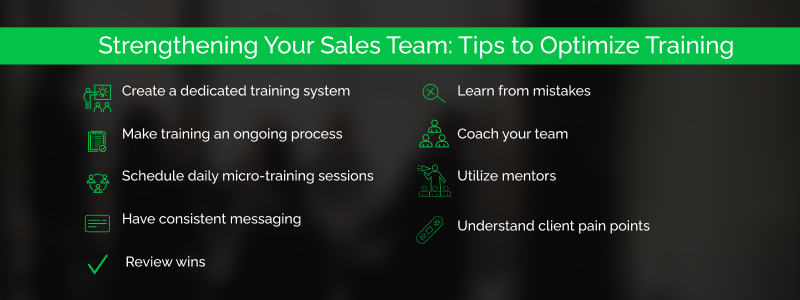Strengthening Your Sales Team: 9 Tips to Optimize Training

How to create an effective sales team training strategy that will make your company stronger

Your sales team needs to know how to use your CRM and other sales tools. They also need to understand your products and services inside and out and have a clear understanding of your target clients. Before they approach a prospect, they should have the script memorized and rebuttals ready to go. They also need to understand client onboarding and your organization's workflows.
Getting all this knowledge into your salespeople requires a lot of sales training. But to safeguard your resources, you need to ensure you optimize your time and don't just spin your wheels. Ready to get started? Then, check out these nine tips for strengthening your sales team.
1. Create a dedicated training system.
Every salesperson who joins your team should go through a dedicated training system. You should develop a training system that covers all of the essentials such as your tools, products or services, target personas, and of course, sales techniques.
If you send people into the field without a clear understanding of what they're selling and the best ways to sell it, they won't perform up to their potential and your business will lose out on opportunities. A dedicated, memorialized training system helps your team build better relationships and close more deals.
2. Make training a constant process
No one gets in shape by going to the gym once. And once you're in shape, you have to keep going if you want to maintain your gains. Sales training is the same. It can't just happen when you hire someone, you need to provide frequent training to your salespeople while they work for your company.
Hold weekly or monthly training sessions where you work on core sales techniques and refine advanced skills. Also, go over any new offerings or changes to your products and services. Then, review the sales pipelines, success stories, and new developments.
3. Schedule daily micro-training sessions
Like developing any other skills, sales requires repetition. You don't need to do long, drawn-out training sessions every day, but you should schedule daily micro-training sessions. Take about six minutes or less to show your team something new or highlight an existing skill. Then, have them role-play.
Microsessions help your sales team learn new skills without taking them away from the actual work of selling. They are also a great way to warm up for the day. If your team goes into the field or jumps on the phone while cold, they generally won't be as strong during the first few interactions. If they've practiced the script through roleplaying, they'll be confident and ready from the get-go.
4. Be consistent
To make sure everyone is marching to the beat of the same drum, your sales leaders need to have a consistent approach to training. If their ideas deviate from each other, they will pull your team in different directions. Make your expectations very clear to your sales team leaders and ensure they're passing consistent messaging to your sales team.
Codify all of your expectations and procedures to ensure everyone gets trained in the same way. An inconsistent or piecemeal approach to training will take more time and deliver less effective results.
5. Review wins
One of the most effective training techniques is to watch a master in action. Watch or listen to recordings of successful sales interactions. Then, break down what the salesperson did right and help your team learn from their successes.
Also, use your team's successes to develop your training materials. Use recorded or observed sales interactions to refine your script and improve answers to objections.
6. Learn from lost opportunities
Learning from mistakes is important for all types of business success, and it's critical for strengthening your sales team. In addition to watching videos or listening to recordings of successful deals, also look for blunders.
Talk about what the salesperson did wrong and how they could have improved the situation. Don't just explain what went wrong. Have your team identify what they think went wrong and brainstorm more effective strategies.
In many cases, you can find success and mistakes in the same sales call. No one is perfect, and salespeople often have multiple failures and victories in a single interaction. If you don't have any recorded sales calls, you can simulate the process by having trainers act out a sale for the team.
7. Coach your team
A manager is often a detached authority figure or someone who breathes down your neck and makes you nervous. If you want your sales team to thrive, you need to avoid this style of leadership. Instead, focus on coaching your team.
Notice their strengths and find ways to bring them out. Provide constructive feedback that helps them improve their sales techniques. Invest in their success, not just for the sake of the organization but also for the sake of their personal and professional development.
8. Utilize mentors
Your sales team can learn a lot from your strongest sellers. Create relationships that allow this to happen. When new salespeople start, have them shadow a successful team member. Create mentor/mentee relationships between salespeople so they can learn from each other.
Training also helps the trainer. In most cases, people learn a lot when they're teaching someone new skills.
9. Understand client pain points
The definition of selling is to persuade someone of the merits of something. An archaic definition of the word is to trick or deceive someone. These ideas continue to permeate many people's perceptions of sales. Think of the stereotype of the used car salesman.
However, this is a misconception. The most effective salespeople don't sell, and they certainly don't trick or deceive. Instead, they understand the client's pain points. They actively listen and observe the client to develop an understanding of their challenges. Then, they present a product or service that meets the client's needs.
Sales training needs to be simple, practical, and repeatable. The trainers need to have deep experience and credibility. The training should be relevant and memorable. It should provide your team with actionable skills that they can use to improve their interactions with prospects.
At MetaGrowth, we leverage decades of experience to help you develop a training program for your sales team. We can help you identify the tools you need, plan your training system, and enable your sales team. Ready to learn more? Then, contact us today.
Written by
Joe Arioto
